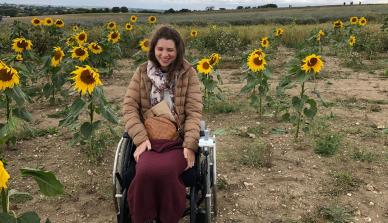There's lots to think about when considering starting a family but what about when you're living with multiple sclerosis? While everyone around her seems to be having children, Edith is having to consider what impact the decision could have, not only on her life but on her MS too.
I was diagnosed with MS at 16 after numbness, pain, and weakness in my leg. I didn't even know what MS was at the time but began injecting weekly beta-interferon. My condition was stable until my mid-twenties so initially it didn't interfere with my life too much. However, by 2012 I was walking with crutches and moved on to Tysabri infusions, which I still take. I now use a wheelchair permanently.
Currently in my mid-thirties, the baby bombardment has arrived. Whether that's the steady influx of friends or former school peers reproducing, or the ads for maternity clothes and follow-on milk on my screens. What already feels like a huge decision for most people, becomes harder to process with the extra complications of severe MS and disability.
As a younger, healthier girl, I kind of assumed that I would have children. A good friend explained to me that it's harder to imagine a childless life when that's not the environment we've known. But when I found myself single and needing to use a wheelchair, I reshaped my vision. It took time, therapy, and a course of antidepressants but I learned to live with the grief.
When I started taking Tysabri nine years ago, the guidance was clear: you should not conceive whilst taking MS drugs. However, I spoke with my former MS nurse a few weeks ago, and the guidance has changed. Subject to the prescribing neurologist, it is possible to receive Tysabri into pregnancy. I must have missed the announcement accompanying this pretty major change in advice.
To keep things complicated though, JC positive, 'high risk' patients like myself are now being moved onto Ocrevus. A year ago, when I thought I had no drug options, I would have jumped at the chance, but you cannot conceive whilst on Ocrevus. While I would love not to be tied to my hospital Tysabri infusions every four weeks, the decision to switch treatments is now tied to ‘the life decision' of whether to have children.
Unfortunately, there's no template for how my MS and life will be with or without children. My partner is also undecided, which I understand given the potential consequences for us both. I know there is no ‘right' answer, but would having children in my severely disabled condition be impossibly hard for me, my partner, and the children themselves?
Equally, the only certainty I have is that my MS will continue to progress and deteriorate, so is it better to crack on? In a decade's time would I regret being childless? I would never want a child to become my carer and look after me, but having a family unit does make my increasingly disabled future look less scary.
And what about pregnancy when you're as physically limited as I am? Does pregnancy in a disabled body increase the risk of other physical problems? Would a caesarean even be possible with my suprapubic catheter? Would I be able to receive increased social care to help?
Friends who have gone through parenthood give the puzzling advice that it is both the hardest and best thing they've done. Living with MS is hard, organising social care is hard, and I didn't choose any of that. Most MS charities have guidance on pregnancy, but the condition is so wide-ranging in symptoms and severity that it's impossible to find specific answers. There is also the reality that my child would have a higher risk of MS, about 1 in 50, and although MS treatments are constantly developing, I would hate to pass the illness on. That's without even thinking about how the fatigue of parenthood would affect my own health...



